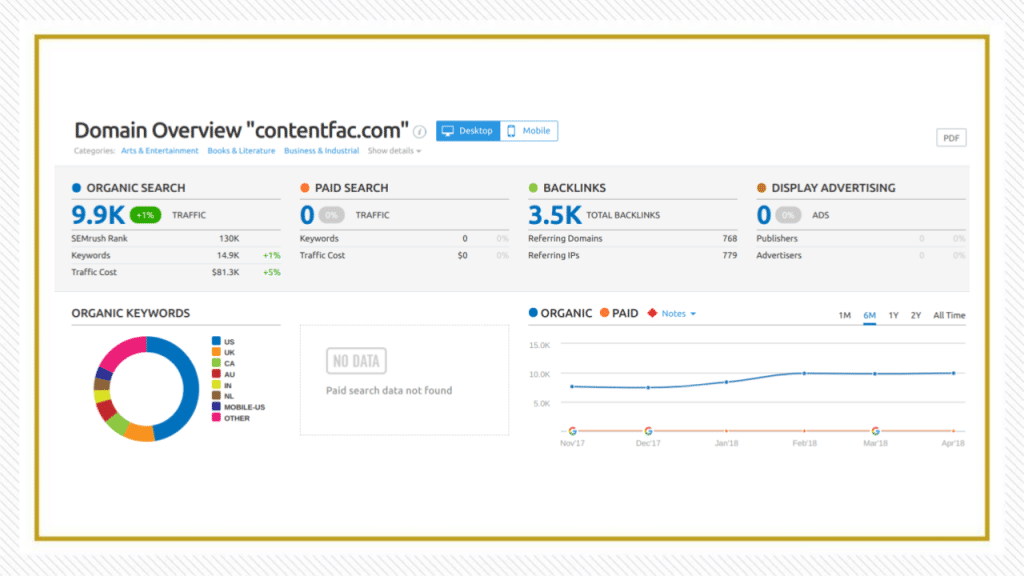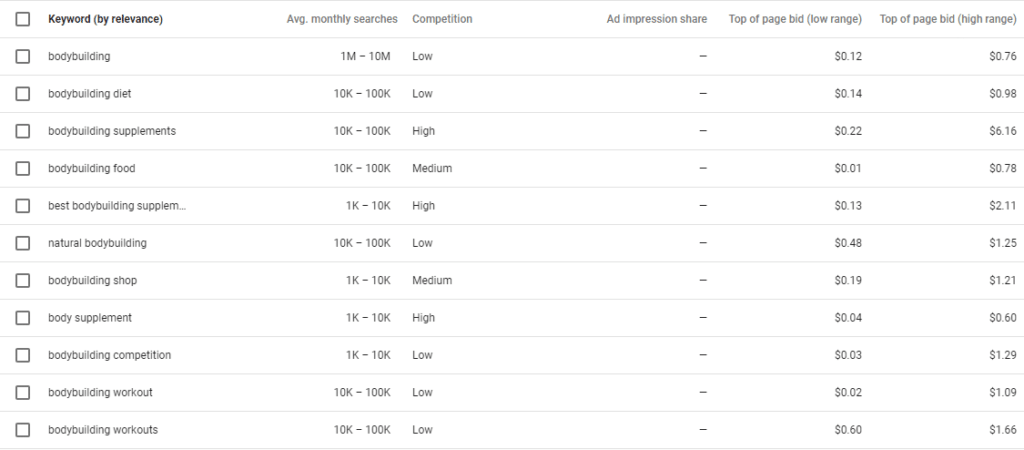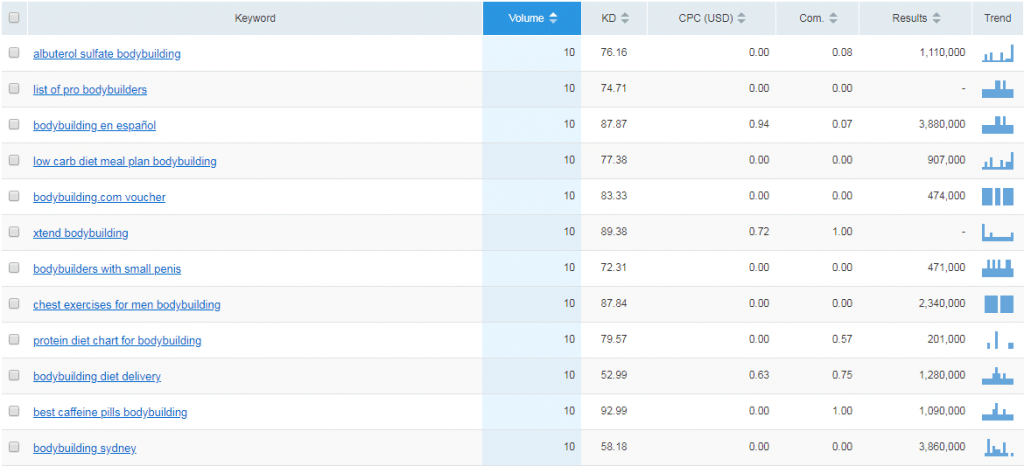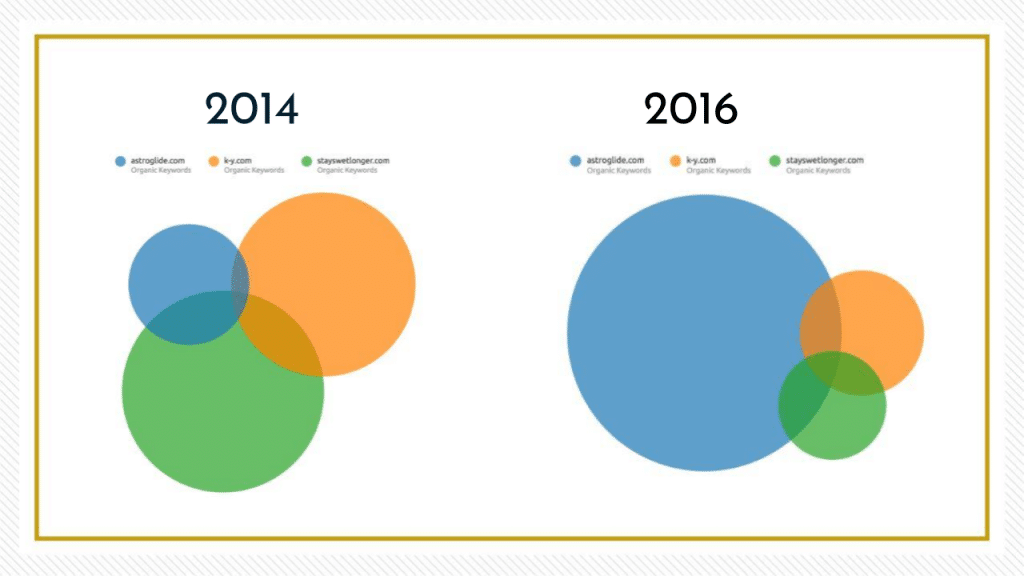We’ve written before about our love of SEMrush for keyword research and analysis, so we were thrilled to co-host an SEO webinar with SEMrush Inbound Marketing Strategist Paul Klebanov! We’ll cover the same topics in this blog post, but if you have an hour to level up your SEO game, make sure to check out our master class on YouTube.
You’ll learn:
- How The Content Factory uses keyword research and analysis to help clients generate millions of dollars of organic traffic each year, whether they’re brand new start-ups or well-known national brands — and how you can do the same using our SEO tactics.
- Why paid traffic (AdWords, Bing Ads, etc.) will never be as valuable as organic traffic in terms of business ROI.
- How to research and select the best keywords for your SEO and content marketing strategy.
- How to see which keywords your competitors rank for, and then knock them out of the top search results.
Before we dive into the deep end, let’s get familiar with the basics!
What is Search Engine Optimization (SEO), and Why Does it Matter?
SEO is the strategy of optimizing a web page to rank well in the search engine results pages (SERPs) for specially chosen keywords to increase organic traffic and conversions.
Using SEO best practices, you should strive to rank 1-3 on the first page of Google (or Bing, for the handful of renegades who use it) for a high-value keyword phrase. People searching for that phrase will learn who you are and engage with your content first — and if you’re a new business with big-name competitors, search optimization can give you a serious edge in the attention economy.
SEO vs. Paid Traffic (AdWords, Bing Ads)
AdWords uses keywords too, so what’s the difference? AdWords and Bing Ads only generate traffic as long as the ad is running, and you pay for every click or conversion the ad generates. Once the ad spend is gone, the traffic stop. If you think of traffic as the fuel for your website, once AdWords fuel runs out, your car stops running.
Unlike paid search advertising, organic traffic is free (once you do the work), and comes to your website through search engine queries. SEO continues to generate traffic over time as it generates clicks, social shares and awareness. It’s the website fuel that never runs out. (If only we could build an internal combustion engine on it!)

Using SEMrush, we can see that The Content Factory ranks organically for 14,900 keywords, generating thousands of website views each day. Take a look at our organic traffic (the blue line) vs. our paid traffic (the orange line). That’s right — we don’t pay a penny in AdWords spend, because we get $81,000 of traffic just through SEO!
What is Keyword Research in SEO?
Keyword research is the method of identifying the best keywords to target to help you generate organic traffic to your website, increase conversions and create tangible ROI for your business.
Keyword research and analysis is the first step in any SEO process, and it’s important that you get this foundational layer right. If you’re not targeting great keywords for your particular business, you could be putting in countless hours of SEO work without getting the results you want.
Which Keywords Should I Target?
If you pop a topic into Keyword Planner or SEMrush and target the first 50 keywords you see, there’s a slim chance you’ll end up on the first page of Google, and a much better chance that you’re wasting resources on keywords that don’t help you reach your marketing goals.
To get strategic with keyword research and analysis, you need to think about the keyword’s metrics, the user’s intent, and how that all fits into your marketing funnel. Let’s start with intent.
Three Types of Keywords: Transactional, Informational, and Navigational
What’s a Transactional Keyword?
Transactional keywords are search engine queries made by people who are looking to buy a product or a service, and are great for bottom-funnel conversions.
What to look for:
- Adjectives — “best”, “cheapest”, “red”
- Brand names — “Nike”
- Detailed descriptions — “men’s high top basketball shoes”
Transactional keywords are usually more competitive than other kinds of queries, but they have a much higher conversion rate. The trick is find transactional keywords with lower competition. (More on that later!)
What’s an Informational Keyword?
Informational searches are used by people who are looking to gain more information into a subject — usually the “what” or the “how.” They can help you establish your brand as an authority on a certain topic. You can turn that cachet into conversions by targeting specific, long-tail keywords and closing your content with a powerful call-to-action.
What’s a Navigational Keyword?
Navigational searches help people find your web page and are often branded. If someone searches for “The Content Factory,” for example, they already know what they’re looking for. It’s important to rank for your own navigational keywords, but this usually happens naturally.
What Are Long-tail Keywords, and Why Should I Target Them?
Long-tail keywords are longer queries that allow you to target a specific audience who is searching for exactly the thing that you have to offer. A long-tail like “cost of social media marketing” is a better keyword to target than “social media” for two reasons:
- It’s unlikely we’ll be able to rank well for a keyword as broad as “social media”
- Even if we did rank #1 for “social media,” the traffic we’d receive for that content wouldn’t be coming from people most likely to convert.
“Cost of social media marketing” is a great keyword for TCF to target because the person searching that phrase is likely in the research phase of the buyer’s journey, eventually planning to make a purchase. If you can insert yourself into that research process and demonstrate your expertise by answering your potential customers’ questions, you can get that person into your sales funnel.
What Are Local SEO Keywords?
If you serve a specific geographic area, you should also be targeting keywords like "best pizza in Philadelphia" or "chiropractors in Pittsburgh," in addition to following these local SEO best practices.
3 Important Keyword Metrics for Effective SEO
Search Volume: How Much Traffic Will This Get Me?
Search volume tells you how many monthly searches people make for a particular keyword. The more search volume a keyword has, the more traffic you have the potential to earn if you can rank well for it.
CPC (Cost Per Click): How Much Are Other Companies Paying For This Term?
CPC measures how much money it would cost to get one click targeting a keyword in Google AdWords. If other businesses value that keyword highly, it’s usually a good indication that it converts well.
Competition: How Hard Is It to Rank For This Keyword?
Who is currently ranking for a particular keyword, and how hard would it be to kick them out of the top spots? To get an idea for how competitive a keyword is, open up an Incognito tab in Chrome, search for the term you’re targeting and see what content ranks in the top three results. Can you create content that’s 10x better than that?
91.5% of search traffic goes to sites that rank on the first Search Engine Results Page (SERP). Of that, the top three results take 61.5% of the clicks, with 32.5% going to the first result (Chitika). Unless you can rank in the top ten results, you’ll get very little search traffic. (There’s an old SEO joke: where’s the best place to hide a dead body? On the second page of Google search results — nobody ever gets that far.)
How to Research Keywords for a Niche Manually
Here’s the old-fashioned way of researching keywords, using “bodybuilding” as an example. Search for “bodybuilding” in Google Keyword Planner, then click “Get Ideas.” Google will provide you with 436 related search queries, which you can then export that into a spreadsheet for a master list.

You can also use Google itself, looking for “related searches” at the bottom of the page. Copy and paste those terms into your master keyword list. Bolded words in those related searches (for example, “workout routine,” “supplements,” etc.) are semantically related, and valuable to include in your content.
You can also use autosuggest for additional related searches. Go through the alphabet “bodybuilding a…” and type those searches into your master list, going through the alphabet from A-Z.
It’s a long, labor-intensive process. Luckily, there’s a better way.
How to Use SEMrush for Keyword Research and Analysis
SEMrush is a complete end-to-end SEO platform, but for this post, we’ll focus on using its use as a keyword research tool. Search for a keyword in Keyword Analytics to receive an autogenerated list of related keywords with their volume, keyword difficulty, CPC and competition. Phrase Match gives you keyword queries that contain “bodybuilding,” while Related Keywords provides more keywords that may or may not contain the term.

You can filter these results to include or exclude certain words, then export them to a spreadsheet for your master keyword list.
Another way to use SEMrush for keyword research and analysis is to see what your competition ranks for — this would be impossible using the manual method! Use the Domain Analytics feature to input your competitor’s domain, click Search, and you’ll receive a list of keywords your competitor ranks for, along with how well they rank for those keywords, the URLs that landed them those SERPs, competition and keyword volume.
Keyword Research Competitive Analysis

These charts show what we were able to accomplish for Astroglide in just two years. Using targeted keyword research and an aggressive blog strategy, we increased the number of keywords Astroglide ranks for drastically, while improving the rankings for those keywords. As you can see from the size of the blue bubble from 2014 to 2016, Astroglide trounced its competition in terms of organic traffic.
How to Write 10X Content and Beat the Competition
You’ve found the perfect keyword target — great! But the first three results for that query go to well-known brands. How can you make sure that your content generates better results than theirs?
- Create longer, more informative, more engaging content.
- Link to sites with high domain authority (use target=“_blank” to ensure external links open in a new tab — this helps improve time on site and bounce rate).
- Solicit expert commentary for your article using Twitter or HARO. This often earns you a backlink from those experts, as well as promotion on their social networks.
And of course, make sure you’re using keywords in headers, image alt text, and meta descriptions, along with other best practices for search-optimized content.
How to Structure 10X Content for SEO
When done correctly, the organization and flow of your content should capture readers’ attention and guide them to the conclusion that you can help solve their challenges. Paul Klebanov recommends the following structure:
- Identify the problem your target audience is facing. Research your personas to determine what their goals are — and what’s keeping them from achieving those goals.
- Address your audience’s pain points. Write about the issues your target audience is likely facing.
- Provide an actionable solution. Here’s where you resolve those pain points. This is a great opportunity to create a complete step-by-step guide to overcoming a particular challenge.
- Exceed their expectations by giving something away to aid their journey. Maybe your reader isn’t ready to convert yet, and that’s fine! Keep their interest by providing something else of value. That could be a link to another article that’s relevant to their goals, a registration link for your newsletter, a free demo of your software, an ebook — the sky’s the limit!
Learn More With Online SEO Training
Keyword research and analysis are important components of your SEO strategy, but it’s only the beginning! Learn more about on-page SEO, technical SEO, content promotion, and more with our Content Writing & SEO Training series.
Receive SEO coaching from the experts at TCF in the comfort of your office or home. We’ll share all of our internal guides on keyword research and analysis, content writing and editorial calendar development, a complete list of keywords your business should target, six months of suggested blog topics and more. We’ll walk you through all the SEO tools we use, from SEMrush to BuzzSumo.
Click here to learn more about SEO training!



Thanks for sharing the list of keywords research tools. These tools are very useful to find appropriate keywords which is very useful for ranking.
Great article!!!
Your information gives us useful and depth knowledge of keyword research. Thanks for sharing!